Posts by Christopher Lochhead
143 What’s the Role of Business, Beyond Business?
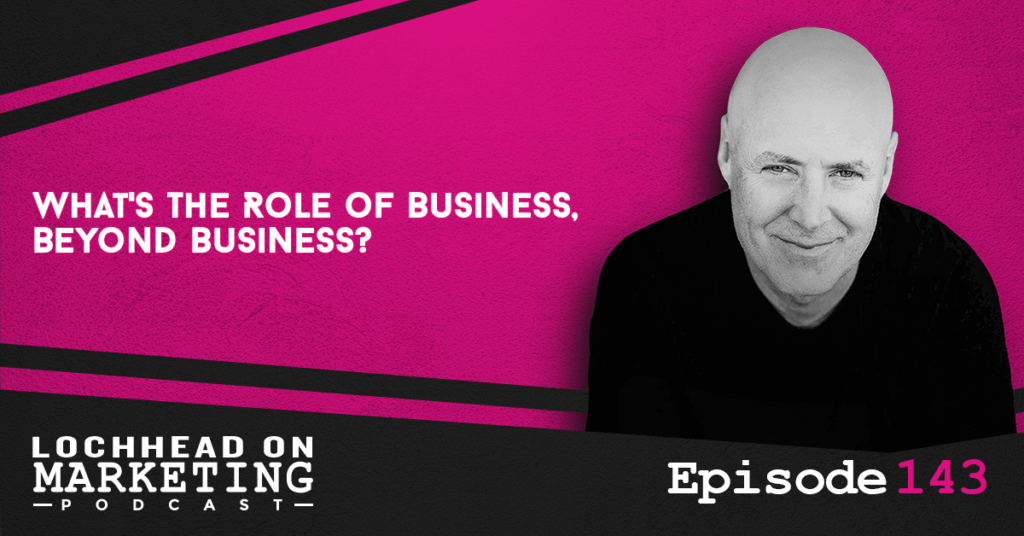
Podcast (lochheadonmarketing): Play in new window | Download (Duration: 7:13 — 5.0MB) | Embed
Subscribe: Apple Podcasts | Spotify | RSS | More
On this episode of Lochhead on Marketing, let’s ask what is the role of business, beyond just business.
Today marks the 5th day into the Russian invasion of the Ukraine, the first attack of its kind since Sept. 1, 1939 – the start of World War 2. So let’s talk about how this affects businesses, and how businesses can affect it.
Roll Call for Companies
According to the Wall Street Journal, the US is still buying 8% of its oil from Russia. On the commercial side, there has been no announcements by companies such as McDonalds, KFC, Burger King, and Papa John’s to name a few, on closure of their branches in Russia, temporary or otherwise.
On the tech side of things, there have also been no word from Jeff Bezos, Bill Gates, Mark Zuckerberg, nor from Google CEO Sundar Pichai, Microsoft CEO Satya Nadella, as well as CISCO CEO Chuck Robbins and Oracle CEO Safra Catz on their stance and plans as things progress in Russia.
I’m disheartened, somewhat defeated, and absolutely fucking royally mad about the silence from Silicon Valley on this topic.
There are some exceptions, of course. Criticize the man all you like, but Elon Musk made a commitment to keep the Ukraine connected to the internet via his Starlink satellite internet. Less than 48 hours after he made that promise, a shipment of Starlink terminals arrived in the Ukraine.
Businesses Getting Involved in War
There are those on the web that criticize people who celebrate when big corporations do something in the situation. My response to them is this:
“Anyone who supports in any way, a free democratic society, who is being invaded, attacked, and mass murdered is a hero.” – Christopher Lochhead
Now, if you wish to join me in making a financial contribution, we took a list of charities helping in the Ukraine(published by NBC News). You can check out that list of charities and I encourage you to crack open your wallet and see if you can make a difference for the people of Ukraine. You can also donate to Doctors Without Borders as they mobilize to help Ukraine and nearby countries that were affected.
The Role of Businesses beyond Business
As a business owner or entrepreneur, you might be asking – how exactly can businesses help in this situation?
Well, imagine what would happen if all the tech security companies pulled the plug on the Russian government and on major Russian enterprise. Imagine if all tech infrastructure companies pulled the plug on Russia. Imagine if all of the SAS application companies, the database companies, the gaming companies, the IT operations companies shut down Russia’s digital world, the digital world is as important today as the analog world. if they manage to shut down the Russians government’s ability to do things in the digital world, we’re going to shut down a lot.
Of course, there are certain companies and certain situations where it makes sense to keep doing business. In Russia, for example, communication, and social platforms is critical for Russian citizens to be able to see and hear what their government is doing in the Ukraine.
So what leaders do in times of crisis matters, what you and I do in times of crisis matters. If the US federal government will not stop buying Russian blood oil, will we stop doing business with Russia? Will our CEOs put peace before profits? Or will businesses do whatever they want to do?
It’s easy to be great when everything’s great. But what defines our lives is who we choose to be in times of crisis.
Bio
We hope you enjoyed this episode of Lochhead on Marketing™! Christopher loves hearing from his listeners. Feel free to email him, connect on Facebook, Twitter, Instagram and subscribe on iTunes!
263 What’s the Role of Business, Beyond Business?
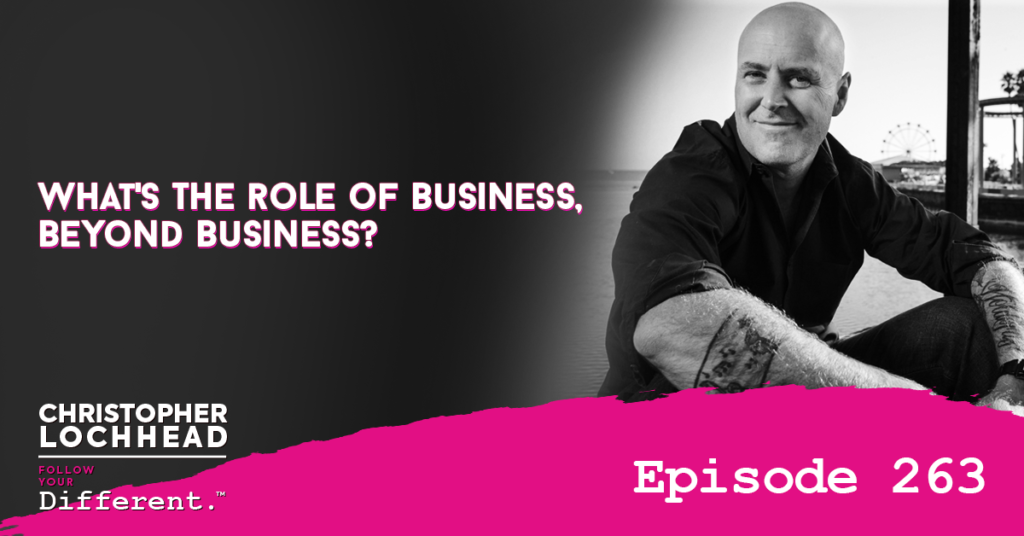
Podcast: Play in new window | Download (Duration: 7:13 — 5.0MB) | Embed
Subscribe: Apple Podcasts | Spotify | Pandora | RSS | More
On this episode of Christopher Lochhead: Follow Your Different, let’s ask what is the role of business, beyond just business.
Today marks the 5th day into the Russian invasion of the Ukraine, the first attack of its kind since Sept. 1, 1939 – the start of World War 2. So let’s talk about how this affects businesses, and how businesses can affect it.
Roll Call for Companies
According to the Wall Street Journal, the US is still buying 8% of its oil from Russia. On the commercial side, there has been no announcements by companies such as McDonalds, KFC, Burger King, and Papa John’s to name a few, on closure of their branches in Russia, temporary or otherwise.
On the tech side of things, there have also been no word from Jeff Bezos, Bill Gates, Mark Zuckerberg, nor from Google CEO Sundar Pichai, Microsoft CEO Satya Nadella, as well as CISCO CEO Chuck Robbins and Oracle CEO Safra Catz on their stance and plans as things progress in Russia.
I’m disheartened, somewhat defeated, and absolutely fucking royally mad about the silence from Silicon Valley on this topic.
There are some exceptions, of course. Criticize the man all you like, but Elon Musk made a commitment to keep the Ukraine connected to the internet via his Starlink satellite internet. Less than 48 hours after he made that promise, a shipment of Starlink terminals arrived in the Ukraine.
Businesses Getting Involved in War
There are those on the web that criticize people who celebrate when big corporations do something in the situation. My response to them is this:
“Anyone who supports in any way, a free democratic society, who is being invaded, attacked, and mass murdered is a hero.” – Christopher Lochhead
Now, if you wish to join me in making a financial contribution, we took a list of charities helping in the Ukraine(published by NBC News). You can check out that list of charities and I encourage you to crack open your wallet and see if you can make a difference for the people of Ukraine. You can also donate to Doctors Without Borders as they mobilize to help Ukraine and nearby countries that were affected.
The Role of Businesses beyond Business
As a business owner or entrepreneur, you might be asking – how exactly can businesses help in this situation?
Well, imagine what would happen if all the tech security companies pulled the plug on the Russian government and on major Russian enterprise. Imagine if all tech infrastructure companies pulled the plug on Russia. Imagine if all of the SAS application companies, the database companies, the gaming companies, the IT operations companies shut down Russia’s digital world, the digital world is as important today as the analog world. if they manage to shut down the Russians government’s ability to do things in the digital world, we’re going to shut down a lot.
Of course, there are certain companies and certain situations where it makes sense to keep doing business. In Russia, for example, communication, and social platforms is critical for Russian citizens to be able to see and hear what their government is doing in the Ukraine.
So what leaders do in times of crisis matters, what you and I do in times of crisis matters. If the US federal government will not stop buying Russian blood oil, will we stop doing business with Russia? Will our CEOs put peace before profits? Or will businesses do whatever they want to do?
It’s easy to be great when everything’s great. But what defines our lives is who we choose to be in times of crisis.
Bio
We hope you enjoyed this episode of Christopher Lochhead: Follow Your Different™! Christopher loves hearing from his listeners. Feel free to email him, connect on Facebook, Twitter, Instagram and subscribe on iTunes!
262 The $21.7T Metaverse Economy, Web 3.0, & The “Great Refactoring”, with #1 Tech Analyst R. Ray Wang, Founder of Constellation Research
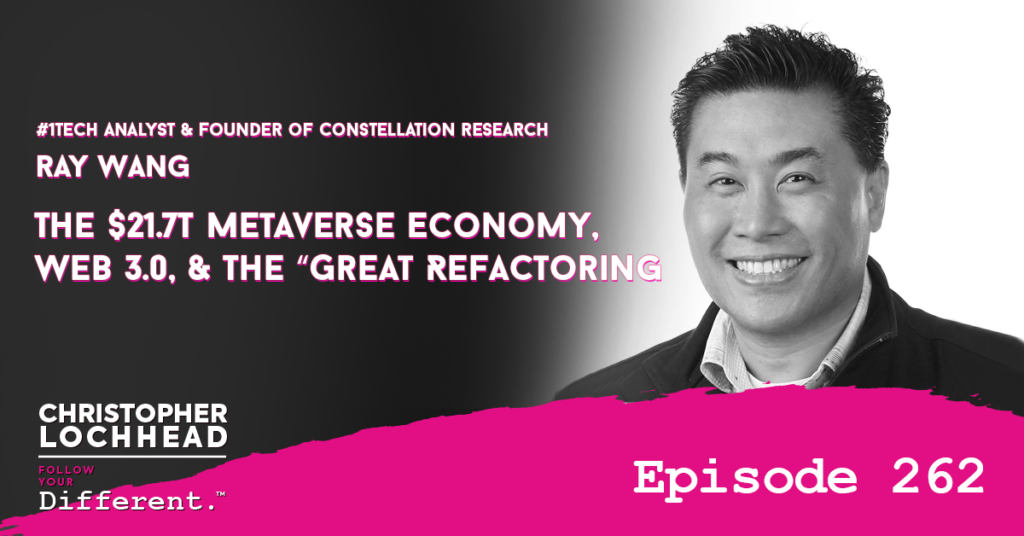
Podcast: Play in new window | Download (Duration: 1:35:51 — 65.8MB) | Embed
Subscribe: Apple Podcasts | Spotify | Pandora | RSS | More
On this episode of Christopher Lochhead: Follow Your Different, Ray Wang is back. Like always, we are in for a treat as we go deep into a whole bunch of topics.
Ray Wang is the world’s number one Tech Analyst, and the founds of Constellation Research. He is the author of the bestselling book; Everybody Wants to Rule the World. Ray also hosts his own very popular podcast, called DisrupTV.
So sit back and join us as we have a deep dialogue about Metaverse, the current status of Web 3.0, and the recent major events that are still affecting everyone to this day.
Ray Wang on the Metaverse Economy
The conversation starts off about the Metaverse and the Metaverse Economy. Ray explains that people’s concept of the Metaverse are still in the infancy stages right now. When they hear metaverse, they think AR, VR, or maybe gaming. Simply put, it’s 2D becoming 3D.
Yet according to Ray, there are bigger implications, particularly in the market it will bring in the future.
“The metaverse economy is something that we’re seeing as a $21.7 trillion market by 2030.” – Ray Wang
That sounds like a big number, because it is. Right now, publicly traded tech companies are valued at around $24 trillion. But if you look at it closely, these companies are gradually shifting into the digital space, which is what we now call as “metaverse”. Slowly but surely, the big companies have been positioning themselves in a strategic spot for when the technology catches up to the concept.
Ray Wang on Web 3.0
All of these changes have been possible by the advent of Web 3.0, which is powered by the blockchain and cryptocurrency. But what exactly is Web 3.0?
In order to explain it, you have to understand what the previous iterations were. Web 1.0 is basically a “Read” aspect of the internet. You can have access to websites, but there aren’t a lot of ways to interact with them. Web 2.0 changed that, moving into the “Read/Write” era of the internet. Now there are more services and functions that we can use over the net, but it comes at the exchange of data and information about the users.
Web 3.0 aims to give the users control over their data, like how blockchains can track every step of the transaction made, or how some can limit the amount of data or even restrict outgoing data from their device and browsers, much like what Apple did to Facebook and other social media platforms.
Or at least that’s the idea scenario. But according to Ray, it all depends on who’s holding the reins to the operation.
“These Metaverse economies by design are hopefully going to favor privacy and anonymity of the user, right? It’s gonna be about creating transparency of the seller and protecting your privacy in a transaction. That’s the intent, right? But like all good technology, it’s really about the people behind the intent.” – Ray Wang
Transparency vs Privacy
Speaking of data control, Ray mentions the recent move by Apple to give users the option to turn off data tracking from various apps has got Facebook bothered. Likely because that’s how Facebook gets most of its revenue by using said data to do targeted advertising and such. Moreover, showing that it could be done could open the floodgates to other tech companies to add such a feature in the future.
It seems Apple is taking it a step further, allowing its users to encrypt emails and essential use the iCloud as their own personal VPN when doing their business over the internet.
On the other hand, as FANG companies (Facebook, Amazon, Netflix, Google) seems to be reaching their saturation point (particularly Facebook and Netflix), Facebook moved to launch the Metaverse and rebranded the company to Meta.
Though the metaverse itself seems like a mega category waiting to happen, the issue lies on the fact that it doesn’t seem to be well-defined yet as to what its goals are. People have a vague idea, and some ideas that support the concept already exist. But it all seems like a premature move by Facebook, spurred by the flagging subscriber count and to clear their bad reputation & start from scratch.
In the end, it’s interesting how companies will approach both Transparency and securing the Privacy of its users in this era of Web 3.0.
Bio
R “Ray” Wang (pronounced WAHNG) is the Founder, Chairman, and Principal Analyst of Silicon Valley based Constellation Research Inc. He co-hosts DisrupTV, a weekly enterprise tech and leadership webcast that averages 50,000 views per episode and authors a business strategy and technology blog that has received millions of page views per month. Wang also serves as a non-resident Senior Fellow at The Atlantic Council’s GeoTech Center.
Since 2003, Ray has delivered thousands of live and virtual keynotes around the world that are inspiring and legendary. Wang has spoken at almost every major tech conference. His ground-breaking bestselling book on digital transformation, Disrupting Digital Business, was published by Harvard Business Review Press in 2015. Ray’s new book about Digital Giants and the future of business titled, Everybody Wants to Rule the World will be released July 2021 by Harper Collins Leadership.
Wang is well quoted and frequently interviewed in media outlets such as the Wall Street Journal, Fox Business News, CNBC, Yahoo Finance, Cheddar, CGTN America, Bloomberg, Tech Crunch, ZDNet, Forbes, and Fortune. He is one of the top technology analysts in the world.
Links
Follow Ray Wang today!
Website | Twitter | LinkedIn | Constellation Research | DisrupTV
Check out Ray Wang’s latest Book: Everybody Wants to Rule the World
We hope you enjoyed this episode of Christopher Lochhead: Follow Your Different™! Christopher loves hearing from his listeners. Feel free to email him, connect on Facebook, Twitter, Instagram, and subscribe on iTunes!
142 Marketing’s Job Is NOT Serving Internal Customers
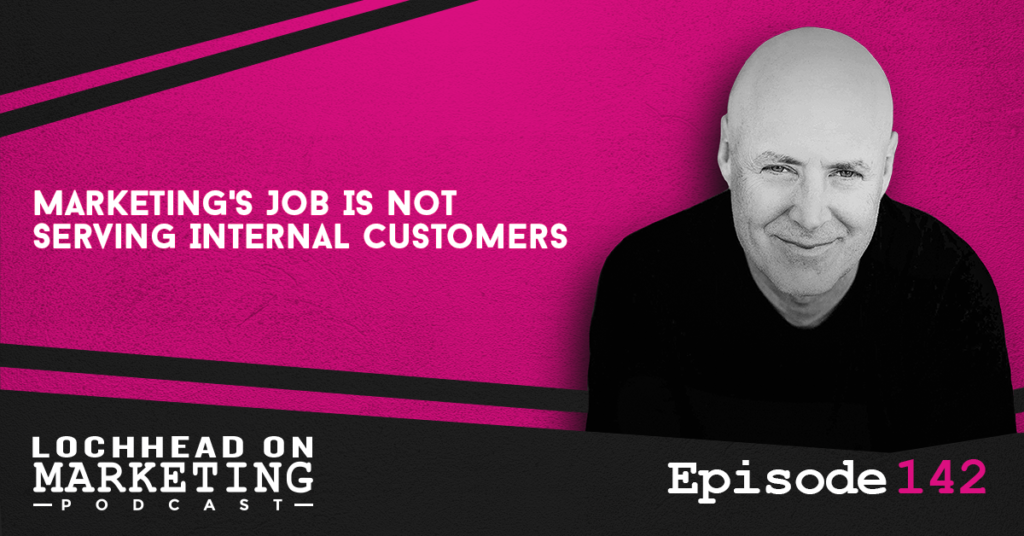
Podcast (lochheadonmarketing): Play in new window | Download (Duration: 13:45 — 9.4MB) | Embed
Subscribe: Apple Podcasts | Spotify | RSS | More
On this episode, let’s talk about one of the things that drives me the craziest and more importantly, ruins marketing results and careers on a regular basis. That is, why marketing’s job is NOT serving internal customers.
Speaking of which, I want to thank you from the bottom of my heart for making our new books into bestsellers at Amazon Books. You can check the whole list Category Pirates mini-books at Amazon Books, and expect more in the near future!
Welcome to Lochhead on Marketing. The number one charting marketing podcast for marketers, category designers, and entrepreneurs with a different mind.
The Concept of Internal Customers is Dumb
The idea of an Internal Customer is dumb. Listen to it: Internal Customer. First of all, what does a customer do that an internal department or “internal customer” doesn’t? That’s right, customers actually pay you money.
Companies who are so internally focused and direct marketing inwardly, that they are confused as to what it should be targeting is a company destined for disaster.
So point number one is this:
“There is only one customer, and those are your actual customers.” – Christopher Lochhead
You can put whatever modifier in front of customer you want, but customers or consumers and putting a stupid modifier in front of them is well, frankly stupid.
What Marketing should be doing
That said, what really is marketing?
Firstly, Marketing is a leadership function. Its job is to lead the company, lead the category and ultimately design and dominate a legendary category that matters around solving problems or creating opportunities for customers.
Second, marketing organizations often get trapped in this feeling of being an internal service bureau. That’s ridiculous. Marketing is no is no more of a internal service function than finance than engineering or products. d in this being of being an internal service bureau. HR is not a service function either. It’s a leadership function.
So the first thing to understand is marketing is a leadership function, whose job is to partner with the rest of the organization in creating, designing, and dominating a market category that makes a giant difference for customers who pay us money.
How Marketing works within the Organization
Now, what does that mean for how marketing works within the organization? You do it as leaders, as you partner with other leaders.
So is Sales Enablement important? Yes, of course it’s important. As a marketing leader, we want the sales organization to love us. Are there a certain set of things that we want to deliver to sales to help them be successful in their job? Of course, there are. But we’re not order takers, we’re leaders. And we’re partners. We’re in a co creation relationship.
You’re in the business of co-creating a legendary relationship. Are there some service elements of that? Sure, there are. But that is not the primary paradigm, the primary paradigm is a co-creation relationship.
That’s the relationship marketing wants to have with sales, that is to say, both of which should get together and say, what are our objectives for the year for the quarter for the month? How do we partner together to produce legendary revenue with the exact kind of customers that we want? So in that regard, marketing and sales work together, hand in glove.
To hear more on how Marketing should be done in your business, download and listen to this episode.
Bio
Christopher Lochhead is a #1 Apple podcaster and #1 Amazon bestselling co-author of books: Niche Down and Play Bigger.
He has been an advisor to over 50 venture-backed startups; a former three-time Silicon Valley public company CMO and an entrepreneur.
Furthermore, he has been called “one of the best minds in marketing” by The Marketing Journal, a “Human Exclamation Point” by Fast Company, a “quasar” by NBA legend Bill Walton and “off-putting to some” by The Economist.
In addition, he served as a chief marketing officer of software juggernaut Mercury Interactive. Hewlett-Packard acquired the company in 2006, for $4.5 billion.
He also co-founded the marketing consulting firm LOCHHEAD; the founding CMO of Internet consulting firm Scient, and served as head of marketing at the CRM software firm Vantive.
We hope you enjoyed this episode of Lochhead on Marketing™! Christopher loves hearing from his listeners. Feel free to email him, connect on Facebook, Twitter, Instagram, and subscribe on iTunes!
261 The Future of School with Ted Dintersmith, Bestselling Author of “What School Could Be”
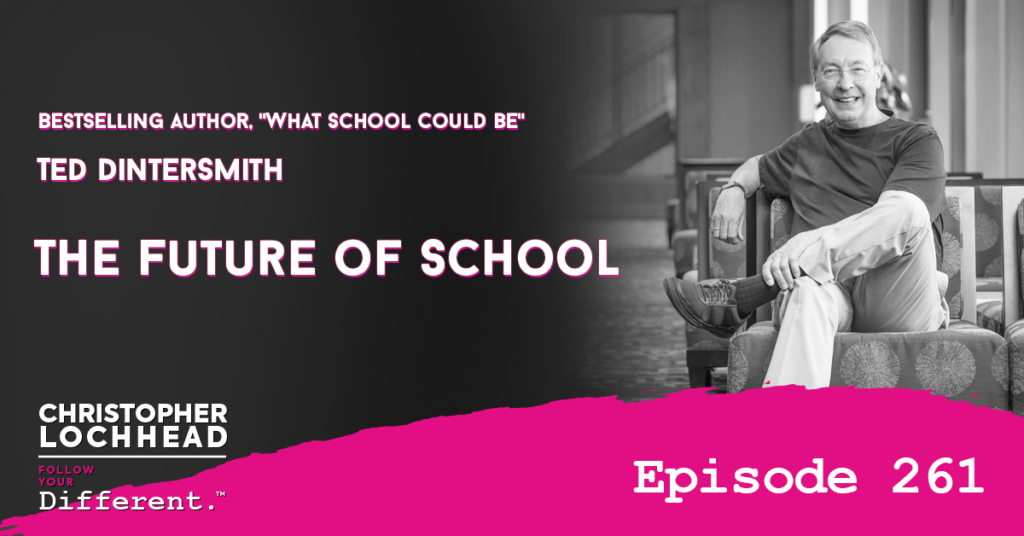
Podcast: Play in new window | Download (Duration: 1:39:13 — 68.1MB) | Embed
Subscribe: Apple Podcasts | Spotify | Pandora | RSS | More
We are currently at the start of a radical change in education of all levels. On this episode of Christopher Lochhead: Follow Your Different, Ted Dintersmith explains what the future of school will be like as the new category of humans begin to shape it anew.
Ted Dintersmith had a career in venture capitalism, but has now dedicated himself in the field of education and improving it. He is the author of a bestselling book, What School Could Be. It is quite an interesting read, and I would recommend you picking it up to learn more about the current state of education.
On this dialogue, we discuss how school can be reimagined, redesigned, and recreated to become legendary. We also discuss what parents, students, and education leaders can do now to develop young people to thrive in the new world.
Also, to hear about my thoughts and position on Spotify and the recent Joe Rogan scandal, please listen to the intro of this episode.
The Current School Systems are Outdated
The dialogue starts as Ted points out how relevant the difference is between Native Digitals and Native Analogs are. If you are not aware what a Native Digital is, check out one of our previous episodes (FYD 250) that talks extensively on the matter.
It is important to recognize the difference, because then you’ll realize that the current school systems are still being run by Native Analogs that prepare students for a world that’s Native Analog. With the rapid growth of technology and the birth of Native Digitals and services that cater to them and them alone, a Native Analog school system will and is slowly becoming obsolete.
The First Step is Recognizing the Problem
The other issue according to Ted, is that when you talk to Native Analogs, they don’t think there’s a profound difference on the matter. Whereas Native Digitals can easily spot the difference.
“You realize that, when you live in a digital world, you have control over what you do. You’re able to go deep on what you’re interested in, the content is either really compelling, or you just switch to something else.
Plop that same kid over into school, and oftentimes, it’s programmed, scripted, boring content that the student has no interest in or voice in, that the teacher really is not that interested in either. But some state legislator, some College Board, or some curriculum writer says, “This is what you got to learn.” And the kids just check out, because I think kids find school boring. They don’t feel they have any real sense of purpose in it. And they know there’s an alternative universe that’s much more compelling.” – Ted Dintersmith
Ted Dintersmith on What School Could Be
The conversation steers to the topic on what the future of school should look like. Ted was then asked this question:
“Besides the baseline subjects such as history, math, science, etc., should the student have the agency to say, “I really want to focus on this or that”?”
Ted shares that he has seen schools that have employed these types of learning system. What he saw was that students were very engaged, and they were easily retaining what they were learning. Also, both student and educator were really excited to be in the classroom every day.
Unfortunately, these school systems were quite rare across classrooms in America.
One issue was the disconnect between what students find enjoyable and engaging, to what the current system thinks the student needs to have a good career when they finish their education. Add to that the rift that growing between Native Analog frameworks and curriculum, and the gap grows bigger.
To hear more from Ted Dintersmith and how we can bring the current school systems to a new era, download and listen to this episode.
Bio
Links
Connect with Ted Dintersmith today!
Website | What School Could Be | LinkedIn
Other Related Links:
Category Pirates: The Digital Education Crisis
NPR: More than 1 Million fewer students are in college
CNBC: More Colleges face bankruptcy but top schools experience record wealth
We hope you enjoyed this episode of Follow Your Different™! Christopher loves hearing from his listeners. Feel free to email him, connect on Facebook, Twitter, Instagram, and subscribe on iTunes!
141 Why Most Marketing Fails, and what CEOs and CMOs need to know to fix it
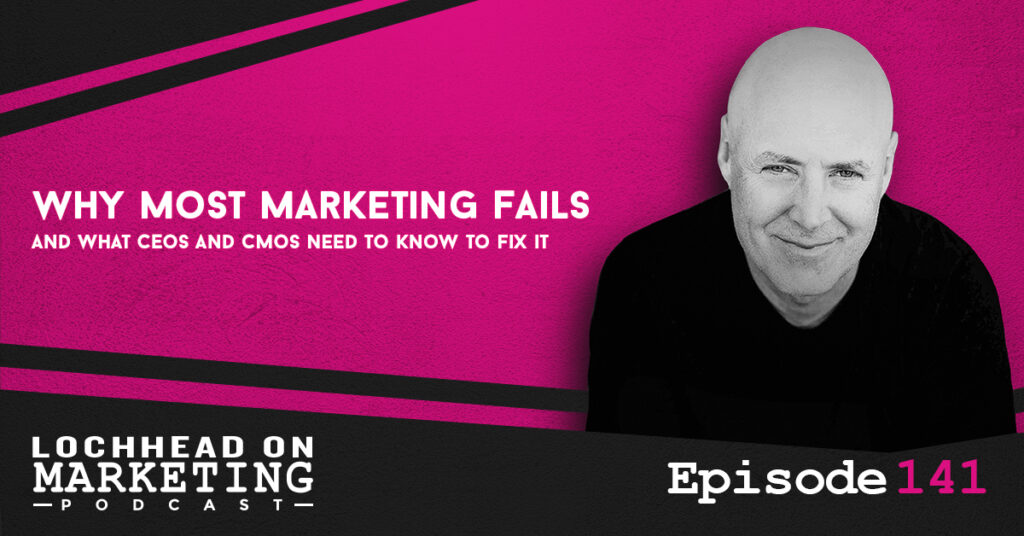
Podcast (lochheadonmarketing): Play in new window | Download (Duration: 8:30 — 5.8MB) | Embed
Subscribe: Apple Podcasts | Spotify | RSS | More
On this episode, let’s talk about why most marketing fails, and what we can do about it.
Speaking of marketing, I want to thank you from the bottom of my heart for making our new books into bestsellers at Amazon Books. You can check the whole list Category Pirates mini-books at Amazon Books, and expect more in the near future!
Welcome to Lochhead on Marketing. The number one charting marketing podcast for marketers, category designers, and entrepreneurs with a different mind.
The Marketing Folklore
When most people say marketing, they usually have a preconceived notion to what it is. That is, to compete for an existing demand with a better product and a better brand in an existing market category.
The reason most people think like this is that it is what is taught in business schools and MBAs. That’s what is said a lot in marketing books and the like. So it has become a belief, almost a folklore, that things should be done as such.
Competing for Leftovers
The problem with this line of thinking is that it’s a very bad idea.
We did a data science project published in the HBr, as well as in our newsletter Category Pirates, and discovered something fascinating. We found that in tech categories, on average, the category king or queen wins 76% of the total value created, as measured by market cap in the entire category.
This means, if you’re not doing category design, you’re playing in someone else’s category. When somebody says marketing, what they’re really saying is, we are going to fight for the remaining 24% of the value.
The issue now is that most companies don’t realize that they’re only fighting for a small piece of the pie.
“Because the vast majority of marketers don’t know that that’s what they’re doing. When they hear the word marketing, they make an unconscious, undiscussed unanalyzed choice to compete in a category designed by somebody else, which only allows for 24% of the value.
And that is why most marketing fails.” – Christopher Lochhead
Bio
Christopher Lochhead is a #1 Apple podcaster and #1 Amazon bestselling co-author of books: Niche Down and Play Bigger.
He has been an advisor to over 50 venture-backed startups; a former three-time Silicon Valley public company CMO and an entrepreneur.
Furthermore, he has been called “one of the best minds in marketing” by The Marketing Journal, a “Human Exclamation Point” by Fast Company, a “quasar” by NBA legend Bill Walton and “off-putting to some” by The Economist.
In addition, he served as a chief marketing officer of software juggernaut Mercury Interactive. Hewlett-Packard acquired the company in 2006, for $4.5 billion.
He also co-founded the marketing consulting firm LOCHHEAD; the founding CMO of Internet consulting firm Scient, and served as head of marketing at the CRM software firm Vantive.
We hope you enjoyed this episode of Lochhead on Marketing™! Christopher loves hearing from his listeners. Feel free to email him, connect on Facebook, Twitter, Instagram, and subscribe on iTunes!
260 The Raging 2020s: Companies, Countries, People, and the Fight for Our Future with NY Times Bestselling Author Alec Ross
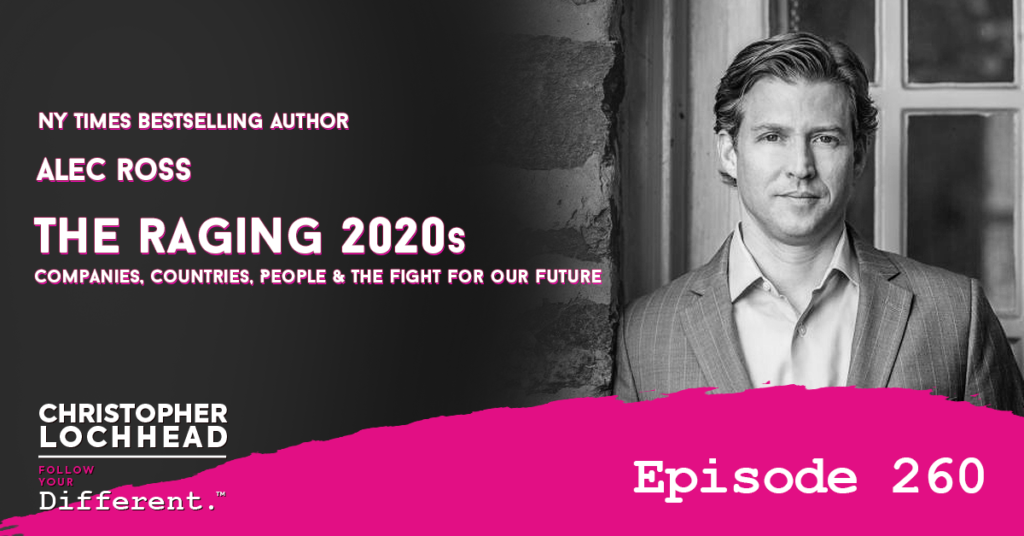
Podcast: Play in new window | Download (Duration: 1:40:51 — 69.2MB) | Embed
Subscribe: Apple Podcasts | Spotify | Pandora | RSS | More
On this episode of Christopher Lochhead: Follow Your Different, we ask the question: Will the future of the United States of America look more like Star Trek or Road Warrior? With us to answer that question is Alec Ross.
Alec Ross is the author of The New York Times bestseller, The Industries of the Future. And he has a brand-new bestseller out called The Raging 2020s: Companies, Countries, People and the Fight for our Future. Alec is a distinguished visiting professor at the University of Bologna business school, and he’s a venture capitalist at Amplo, a global VC firm.
If you have listened to our recent episode with Dr. Cedric Alexander, this dialogue will serve as a great continuation on the State of America (FYD 259), albeit from a different perspective. If you haven’t, why not give it a listen as well?
Alec Ross on Channeling Your Rage
The conversation starts on the topic of Alec Ross’ new book, The Raging 2020s. While the term “raging” often has the connotation of being good, it also can have a bad meaning. While it can denote people having a rolling good time, it can also mean anger, on the verge of violence.
Which is not to say that we should always suppress our anger. For Alec, powerful emotions like that can be a huge part of the creative progress.
“Figuring out how you can harness emotion, anger, volatility, and produce beautiful words, beautiful music, (and/or) beautiful oil on canvas. Also, the greatest athletes are those who know how to focus their rage.” – Alec Ross
For Alec, it’s all about focusing and channeling those powerful emotions into something creative or productive, rather than letting it take over your life.
The Raging 2020s
Exploring further into the book, Alec explains that he wrote The Raging 2020s to show in part why everybody seems so angry right now. As discussed earlier, anger and rage could be channeled into ways that it could be productive. But when the rage becomes more collective, and entire segments of society are angry, what you get is violence.
“I do feel like a lot, there is rage coming right now in America, both from the parts of America that have nothing to lose, as well of those parts of America that have something to protect, and believe that they can’t necessarily grow what they have.” – Alec Ross
Oftentimes, this is what happens when the when there isn’t a shared sense of what we can get together. For Alec, it is something both interesting yet terrifying to observe.
Star Trek or Mad Max?
Alec then talks about the question that is in the heart of his new book. Which is, will our future look more like Mad Max, or Star Trek?
If you aren’t familiar, Star Trek is set on a future where humanity has reached for the stars and enjoys continued progress and abundance. Whereas in Mad Max, we get a dystopian future with scarce resources and chaos all around.
Alec says the future is entirely up to us.
“The degree to which the future does look more like Star Trek or more like Mad Max, is entirely up to us. And I do think that if you have a mindset and an approach that’s rooted in production and creation, as opposed to destruction, that’s the beginning of any sort of progress.” – Alec Ross
To hear more from Alec Ross and how the United States of America will end up in the future, download and listen to this episode.
Bio
Alec Ross is a New York Times best-selling author and Distinguished Visiting Professor at l’Universitá di Bologna Business School.
He is the author of the recently published The Raging 2020s: Companies, Countries, People and the Fight for Our Future.
His prior book The Industries of the Future has been translated into 24 languages and been a best-seller on 5 continents.
He is a Board Partner at Amplo, a global venture capital firm and sits on the board of directors or advisors for companies in the fields of technology, finance, education, human capital and cybersecurity.
He is also an adviser to investors, start-ups and government leaders to help them understand the implication of macro factors emerging at the intersection of geopolitics, markets and increasingly disruptive network technologies.
Specialties include: international market development, executive coaching, cybersecurity, consumer Internet, and board governance.
Recognitions include:
- Named one of Top 100 Global Thinkers by Foreign Policy Magazine
- S. Department of State Distinguished Honor Award
- Oxford University Internet & Society Award
- Huffington Post’s 10 Game Changers in Politics
- Tribeca Film Festival Disruptive Innovation Award honoree
Links
Connect with Alec Ross!
Website | Twitter | LinkedIn | Amazon Books
We hope you enjoyed this episode of Follow Your Different™! Christopher loves hearing from his listeners. Feel free to email him, connect on Facebook, Twitter, Instagram, and subscribe on iTunes!
140 Microsoft Buying Activision Blizzard: What Most People Don’t Get
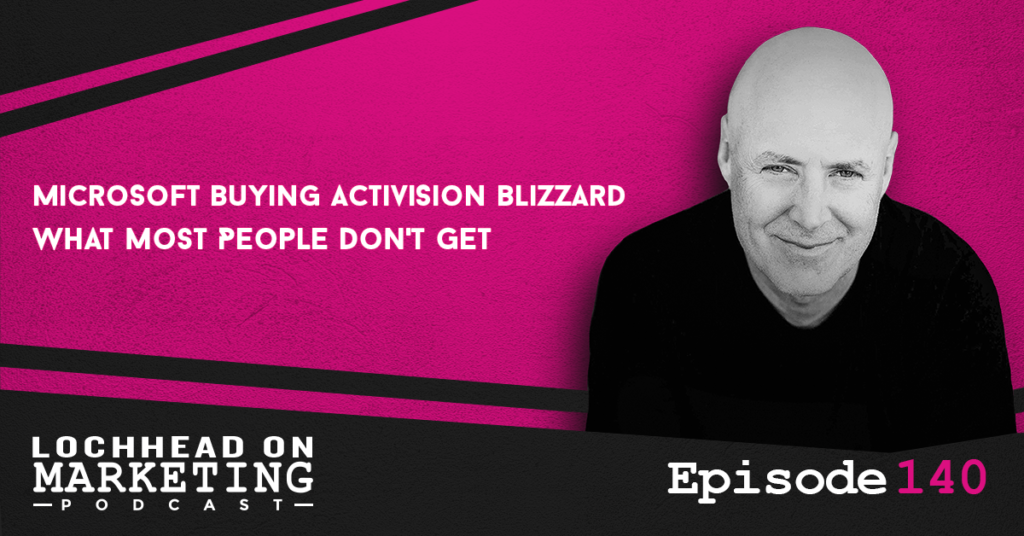
Podcast (lochheadonmarketing): Play in new window | Download (Duration: 12:12 — 8.4MB) | Embed
Subscribe: Apple Podcasts | Spotify | RSS | More
This episode is based on some of the thinking in the #1 bestseller: The Category Design Toolkit: Beyond Marketing: 15 Frameworks For Creating & Dominating Your Niche
Since Microsoft announced that its purchasing Activision Blizzard for $70 billion, a lot of people have called this stupid. Others said Microsoft overpaid, and other various things. So on this episode of Lochhead on Marketing, let’s break down why this acquisition is actually a legendary move and examine the difference between acceleration deals in growing categories, and consolidation deals in slow growth to declining categories.
Let’s also look at Microsoft buying Activision Blizzard from the future, as opposed to from the present.
Welcome to Lochhead on Marketing. The number one charting marketing podcast for marketers, category designers, and entrepreneurs with a different mind.
Did Microsoft Overpay for Activision Blizzard?
Most people think that Microsoft overpaid with the $70 billion price tag on Activision Blizzard. Not necessarily.
People tend to look at this as a consolidation deal, where Microsoft buying a company at a decline, which is not. The important point of the deal was to facilitate Category Acceleration. The goal of this deal or purchase is to buy a leading position in a category with a massive future potential. They are not buying people, products, customers, or even the revenue; they’re buying a dominant position in a category with massive growth potential going forward.
These types of deals are often employed by Category Designers that are actively pursuing the next Category King. A practice that Satya Nadella, the CEO of Microsoft, seems to be well aware of.
The Big Play for the Metaverse
So why did Microsoft purchase Activision Blizzard?
Simply put, Microsoft is making a huge bet on the new Metaverse. For them, the gaming category will be the gateway into getting a solid foothold in the metaverse. Here’s what Satya Nadella has said on the matter:
“Gaming is the most dynamic and exciting category in entertainment across all platforms today, and will play a key role in the development of Metaverse platforms”
Digital Natives and the Digital Gaming Industry
In 2020, the online gaming category in the US reached a peak of 166 billion. Why is that? Well, it’s because of the 140 million Native Digitals in the US alone, 70% of which identify as gamers. Digital Gaming has been a booming business lately that it has far outstripped Hollywood. Also, there are now colleges and universities that offer scholarships to a new category of athletes who play eSports.
Yes, Native Analogs. Young people today are getting college scholarships for playing video games.
Getting a Head Start on the Metaverse
You all probably know about the Metaverse by now, and watched the bizarre presentation that Mark Zuckerberg did. In that presentation, he said Facebook is investing 10 billion on the Metaverse. Microsoft just one-upped them and did 70 billion.
Consider this as well: aside from Facebook, most of Meta’s category-defining products and services were not internal projects. Their key brands and properties were startups that they have acquired once the category has proven successful and already dominate as Category Kings.
In terms of the Metaverse, Meta might be on to something. Unfortunately, it will take a lot of time to develop and visualize what they want their metaverse to be like. Microsoft, by buying Activision Blizzard, sort of stole the march from them and established an initial goal for their idea of the metaverse, and an existing system to implement it on. In other words, this deal suddenly puts Microsoft in the pole position and the driver’s seat.
To hear more about Microsoft buying Activision Blizzard and why it all makes sense, download and listen to this episode.
Bio
Christopher Lochhead is a #1 Apple podcaster and #1 Amazon bestselling co-author of books: Niche Down and Play Bigger.
He has been an advisor to over 50 venture-backed startups; a former three-time Silicon Valley public company CMO and an entrepreneur.
Furthermore, he has been called “one of the best minds in marketing” by The Marketing Journal, a “Human Exclamation Point” by Fast Company, a “quasar” by NBA legend Bill Walton and “off-putting to some” by The Economist.
In addition, he served as a chief marketing officer of software juggernaut Mercury Interactive. Hewlett-Packard acquired the company in 2006, for $4.5 billion.
He also co-founded the marketing consulting firm LOCHHEAD; the founding CMO of Internet consulting firm Scient, and served as head of marketing at the CRM software firm Vantive.
We hope you enjoyed this episode of Lochhead on Marketing™! Christopher loves hearing from his listeners. Feel free to email him, connect on Facebook, Twitter, Instagram, and subscribe on iTunes!
259 The State of America with Dr. Cedric Alexander, Former Police Chief & President of the National Organization of Black Law Enforcement Executives
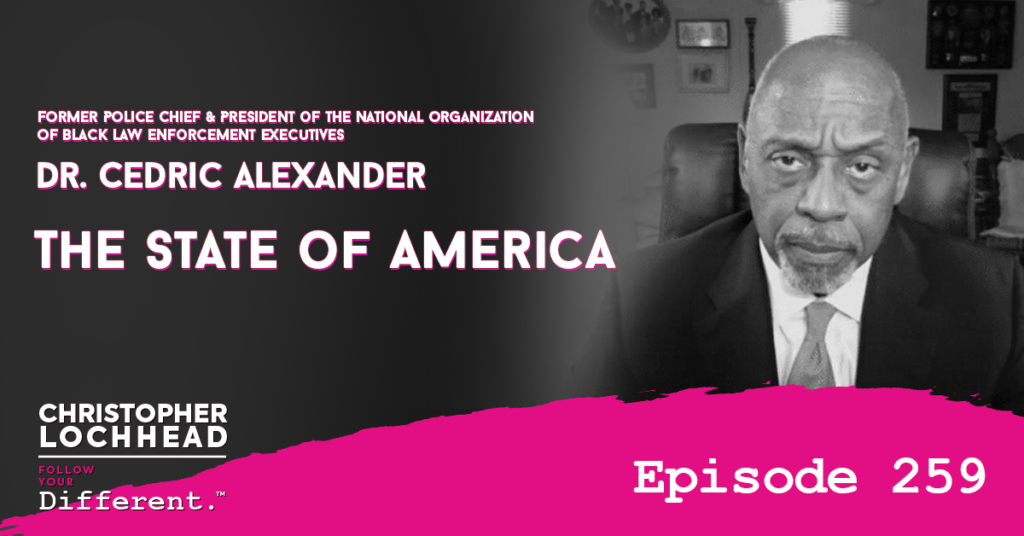
Podcast: Play in new window | Download (Duration: 1:00:47 — 41.7MB) | Embed
Subscribe: Apple Podcasts | Spotify | Pandora | RSS | More
On today’s special episode of Christopher Lochhead: Follow Your Different, we have a deep conversation about the State of America. The United States of America is facing some meaningful challenges right now, and who better to help us unravel everything than Dr. Cedric Alexander.
Dr. Cedric Alexander had a 40-year career in policing, public service, and mental health. He is the former police chief and Public Safety Director in DeKalb County, Georgia. He is also the former police chief of Rochester, New York, where he served as the federal security director in the TSA. Dr. Alexander also served on President Obama’s Task Force on 21st century policing. He is also the author of the hit book, The New Guardians: Policing in America’s Communities for the 21st century.
Now, you often see Dr. Alexander on TV, or even up on a stage giving a speech. But unlike the TV where you only get a few minutes with him, today we go deep in an incredibly thoughtful conversation in a way that you only can on a real dialogue podcast.
Dr. Cedric Alexander on the Upcoming Elections
The conversation started off on the topic of the upcoming midterms on 2022, and the subsequent presidential election on 2024. Particularly, on whether people could expect violence during these times, with regards to the events that unfolded last election.
Being a former lawman himself, Dr. Cedric Alexander can’t help but think about it as well. With regards to what happened in the 6th of January in 2021, it has certainly created a great deal of pause and concern for the country.
As for his perspective, Dr. Alexander thinks that there is too much politics and taking sides involved that the Right and the Left are so divided. He finds it difficult to take sides with one or the other, because his concern and ideas require both sides to work together to fix the nation.
“It’s very difficult to me for me to take sides with one over the other, because I think politics get played all the way around. What I’m concerned about is not their politics, but this nation as we know it.” – Dr. Cedric Alexander
Sit Down and Talk
When asked if there is a chance for both sides to have a more civil dialogue as opposed to inciting violence whenever they don’t get the desired results, Dr. Alexander has this to say:
“My thought is that both sides of the aisle, in my humble opinion, struggle for good leadership. Leadership that is not grounded in the party you belong to. Leadership that is grounded in the fact that we have to work together to find a way, or we’re going to continue to be in this very risky posture that we are in right now. “ – Dr. Cedric Alexander
In order to avoid a repeat of what happened on January 6, it’s going to take leadership coming from both sides of the aisle. Not political leadership, but humanistic leadership. A leadership with proper morals, and one that comes from the heart.
The Perpetuation of the Election Fraud Claims
They then talk briefly about the continuous perpetuation that the election was stolen, despite numerous proofs and actual recounts done in some states.
Dr. Alexander says that this is a dangerous precedent.
“We’re almost at a point where even if I show you that clear evidence of anything, is still not believed. That is dangerous, brother.” – Dr. Cedric Alexander
According to him, this also all boils down to leadership problems, as some of the leaders themselves are perpetuating this belief, in order to curry favor or not be ostracized by their party.
To hear more from Dr. Cedric Alexander and the State of America, download and listen to this episode.
Bio
Dr. Cedric L. Alexander
A visionary leader who has served over four decades in law enforcement and public service, there’s few more qualified to speak on the growing strife between race, communities, and the police.
In his frequent, high profile commentary on CNN’s Amanpour, NBC News, and MSNBC, he poses the hard questions about systemic racism in our country and the need for police reform.
Dr. Alexander remains front and center on these issues that have inflamed our nation.
He speaks out on the violence while providing concrete solutions about how to navigate these troubled waters to address the problems plaguing law enforcement and the communities of color they serve.
Dr. Alexander brings to the conversation lengthy experience as the former Chief of Police in DeKalb County, GA, President of the National Organization of Black Law Enforcement Executives, and member of President Obama’s Task Force on 21st Century Policing. Throughout his career, he has been pivotal in reforming troubled police departments and restoring trust between them and their communities.
He is also the author of In Defense of Public Service: How 22 Million Government Workers Will Save Our Republic that features endorsements from the late U.S. Representative Elijah Cummings, Retired Major General James “Spider” Marks, and attorney Barry Scheck from the Innocence Project.
His insight into the non-elected “fourth branch” of government—our nation’s public servants, civil servants, and first responders—as those who will save the nation by helping bring our greatly divided society together is uncanny during today’s times.
Cedric has testified before the House Oversight and Reform Committee on Facial Recognition Technology, as well as on the pros and cons of using body cameras, drones, and crime mapping in law enforcement.
He sits on the board of the Innocence Project, working to exonerate the wrongly convicted through DNA testing and reforming the criminal justice system to prevent future injustice.
He is also consulting with companies such as AT&T FirstNet, the first nationwide network dedicated to public safety to help law enforcement, fire service, and EMS do their jobs safely and effectively.
With a doctorate in clinical psychology from Wright State University, Cedric is equipped to address the prevailing issues nationwide. In every situation, he conveys a sharp understanding of human nature, the breadth of issues facing our communities, and how to break through to create a solution everyone can unite behind. Widely respected for his ability to lead thoughtfully and respectfully, he transcends both public and private sectors in an effort to foster positive change.
Links
Linkedin: in/CedricLAlexanderPsyD
Twitter: @CAlexLaw
Amazon Books: The New Guardians
Other information about Dr. Cedric Alexander:
This is a Job for Cedric Alexander
Dr. Cedric Alexander on Capitol Security
We hope you enjoyed this episode of Follow Your Different™! Christopher loves hearing from his listeners. Feel free to email him, connect on Facebook, Twitter, Instagram, and subscribe on iTunes!

